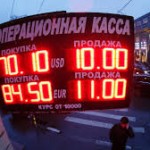Russian companies are preparing to withdraw from London Stock Market

-
Eurasia Drilling, Uralkali, Polyus mull value of foreign stock
-
More may seek to delist as share values slide: BCS’s Chuyko
Russian expansionism is going into reverse, at least on the London stock market.
Three of Russia’s major commodity-related companies are already preparing to withdraw their listings after the bursting of the raw-materials boom and a slump in share sales by the nation’s companies from more than $30 billion in 2007 to below $1 billion this year.
Eurasia Drilling Co. Ltd., the country’s largest oil driller, said last week its owners and managers offered to buy shareholders out and take the company private. That follows a move by potash miner Uralkali PJSC to buy back a major part of its free float, saying in August it may delist shares in London as a result. Billionaire Suleiman Kerimov’s family also plans to take Polyus Gold International Ltd. private.
More may follow as their owners’ interest in using foreign shares as a route to expansion wanes in tandem with overseas investors’ appetite for raw-material and emerging-market stocks, said Kirill Chuyko, head of equity research at BCS Financial Group in Moscow.
Investors’ Appetite
“Each company has a specific reason, but the common one is that investors’ appetite for commodities-related stocks, especially from the emerging markets, is exhausted,” Chuyko said. “At the same time, the owners see that the companies’ valuations don’t reflect their hopes and wishes, while maintaining the listing requires some effort and expenditure.”
Total equity sales by Russian companies this year are set to be about 30 times lower than the 2007 peak, when global commodity prices were about 90 percent higher than current levels. A gauge of worldwide emerging-market stocks has declined 14 percent in the past year. Russia has been among the hardest-hit emerging economies as prices of oil and gas, making up half of the national budget, collapsed since last year. The economy shrank 4.6 percent in the second quarter from a year earlier.
That’s a reversal from when oil prices and growth were high and local companies talked up expanding overseas. Polyus planned to merge with a global rival to become one of the world’s top three gold miners, billionaire Mikhail Prokhorov, who controlled the company at the time, said in December 2010. The producer, which redomiciled to the U.K. in 2012 as part of the plan, never achieved his goal.
Cold War
“In investors’ eyes, Russia is an even less attractive investment than the emerging markets overall,” George Buzhenitsa, an analyst at Deutsche Bank AG in Moscow, said by phone. “The companies don’t see the benefits of the listings anymore.”
The economy is also suffering under trade sanctions from the U.S. and European Union as the conflict in Ukraine drives tensions with Russia to their worst since the Cold War. They deteriorated further this month as Russia engaged in its first military campaign outside the former Soviet Union for decades by bombing Syria, action criticized by the U.S.
The return of East-West antagonisms is also unfavorable for corporate links across the divide.
A planned purchase of Eurasia Drilling by Houston-based Schlumberger Ltd. collapsed in September. Russia’s Federal Security Service, the main successor to the KGB, was holding up the deal, two people with knowledge of the matter said a month earlier. Eurasia Drilling shares plunged more than 60 percent in the past 12 months in London trading.
Greater Liquidity
At Uralkali, down 15 percent in the past year in London but up 31 percent in Moscow as the ruble slumped, the company’s board says it’s moving its focus to the Russian listing because of greater levels of investor interest and liquidity on the domestic market.
“The main shareholders just want the freedom to manage the company in the way they want and they don’t see the need to spend time and money on maintaining the listing,” Konstantin Yuminov, an analyst at Raiffeisenbank International AG, said by phone.
The reduced ambitions shown in overseas listings are also seen in cuts in operations abroad. Severstal PJCS, which once sought to become one of the top-five earning steelmakers in the world, sold its U.S. unit for more than $2 billion in 2014. GMK Norilsk Nickel PJSC, Russia’s largest miner, completed the sale of its assets in Australia and Africa the same year.
Evraz Plc, Russia’s second-largest steelmaker by output, delayed an initial public offering for a North American pipe and rail producer in 2014 after selling Czech operations a year before.
“When the Russian companies were selling shares to investors in the past, they were hoping to use the equity either as a source of financing or for mergers and acquisitions,” BCS’s Chuyko said. Now, “companies do not see the equities market as a potential source of capital. It can’t be excluded that some other delistings may follow.”
Source: Bloomberg – The Russians Are Going: London Sees Listing Exodus as Prices Sag





























